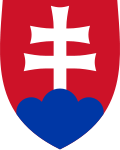- Constitution of Slovakia
-
Slovakia 
This article is part of the series:
Politics and government of
SlovakiaConstitutionDivisionsForeign Policy
Other countries · Atlas
Politics portal
The passing of constitution is now remembered as Constitution Day on 1 September.
Contents
History
Overview
The text of the Constitution is divided into the preamble and 9 parts (most parts are divided into chapters), which in turn are divided into 156 articles and they may but don't need to be divided further into paragraphs and/or letters.
- The Preamble
- First part
- General provisions (a. 1 to 7a)
- State symbols (a. 8 and 9)
- Capital of the Slovak Republic (a. 10)
- Second part - Fundamental rights and freedoms
- General provisions (a. 11 to 13)
- Fundamental human rights and freedoms (a. 14 to 25)
- Political rights (a. 26 to 32)
- Rights of national minorities and ethnic groups (a. 33 and 34)
- Economic, social and cultural rights (a. 35 to 43)
- Right to protect the environment and cultural heritage (a. 44 and 45)
- Right to judicial and other legal protection (a. 46 to 50)
- Part one and part two joint provisions (a. 51 to 54)
- Third part
- Economy in the Slovak Republic (a. 55 to 59)
- Supreme Audit of the Slovak Republic (a. 60 to 63)
- Fourth part - Legal self-governing bodies (no chapters, a. 64 to 71)
- Fifth part - Legislative power
- National Council of the Slovak Republic (a. 72 to 92)
- Referendum (a. 93 to 100)
- Sixth part - Executive power
- President of the Slovak Republic (a. 101 to 107)
- Government of the Slovak Republic (a. 108 to 123)
- Seventh part - Judicial power (2 chapters)
- Constitutional Court of the Slovak Republic (a. 124 to 140)
- Judiciary of the Slovak Republic (a. 141 to 148)
- Eighth part - Office of the public prosecutors in the Slovak Republic
- Public prosecutors of the Slovak Republic (a. 149 to 151)
- Ombudsman (a. 151a)
- Ninth part - Transitory and final provisions (no chapters, a. 152 to 156)
Amendments
Three fifths of the votes in the parliament are necessary to supplement and/or amend the Constitution. It has been amended 5 times so far, once in 1998, 1999, 2001 and twice in 2004.
- Amendment from 14 July 1998: This is rather a minor amendment: The President could be elected on a suggestion of at least 8 MPs (the President was voted by the parliament at that time) and some of the President's powers were transferred to the Speaker of Parliament.
- Amendment from 14 January 1999: President was no longer voted by the Parliament, and begun to be elected by popular vote for five years. It also changes President's powers and his relations between him and other institutions.
- Amendment from 23 February 2001: It is the greatest amendment so far, relating to the Slovakia's attempt to enter the European Union (e.g. Slovakia will recognize international treaties). It also changes the electoral law, introduces ombudsman to the Slovak law system, transfers right to name judges for unlimited time from parliament to the President and other major or minor changes in functions of nearly all institutions.
- Amendment from 4 March 2004: Minor change to the constitution, from article 78, paragraph 2, where the last sentence was omitted.
- Amendment from 14 May 2004: So far the last change, in relation to the preparation to the European Parliament election, and added sentence about inconsistency of being an MP in the Parliament and in the European Parliament. It also extended rights of the Constitutional Court of Slovakia for ruling whether the election to the EP is constitutional.
External links
- The text of the Constitution on the Slovak government website (Slovak, includes all amendments)
- The text of the Constitution on the Slovak government website (English, includes only the first two amendments)
- The unofficial translation of the Constitution (English, most up to date)
States with limited
recognition- Abkhazia
- Kosovo
- Nagorno-Karabakh
- Northern Cyprus
- South Ossetia
- Transnistria
Dependencies
and other territoriesOther entities - European Union
- Sovereign Military Order of Malta
Law and order in Slovakia Categories:- Politics of Slovakia
- 1992 in law
- Constitutions by country
Wikimedia Foundation. 2010.
Look at other dictionaries:
Slovakia — This article is about the European country. For other uses, see Slovakia (disambiguation). Slovak Republic Slovenská republika … Wikipedia
Slovakia–United States relations — Slovakia United States relations are bilateral relations between Slovakia and the United States. History The fall of the communist regime in Czechoslovakia in 1989 and the subsequent split of the two republics on January 1, 1993, allowed for… … Wikipedia
Slovakia — Slovakia became an independent state in 1993. In 1989, figures held locally gave the number of Gypsies for the region as 253,943, but this excluded many who were not in receipt of any welfare support. According to the 2001 census, Roma number… … Historical dictionary of the Gypsies
Constitution of Russia — Presidential copy of the Constitution. Ratified 12 December 1993 … Wikipedia
Constitution of Romania — Created 21 November 1991 Ratified 8 December 1991 Authors Antonie Iorgovan et al … Wikipedia
Constitution of Georgia (country) — Constitution of Georgia Constitution of Georgia Created July 2, 1995 … Wikipedia
Constitution of Cyprus — Ratified August 16, 1960 Location Unknown Signatories Members of the Cypriot government … Wikipedia
Slovakia — Slovakian, adj., n. /sloh vah kee euh, vak ee euh/, n. a republic in central Europe: formerly a part of Czechoslovakia; under German protection 1939 45; independent since 1993. 5,393,016; 18,931 sq. mi. (49,035 sq. km). Cap.: Bratislava. Also… … Universalium
Constitutional Court of Slovakia — Slovakia This article is part of the series: Politics and government of Slovakia … Wikipedia
Constitution of Hungary — Hungary This article is part of the series: Politics and government of Hungary Constitution President … Wikipedia
